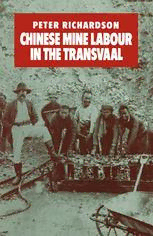
Chinese Mine Labour in the Transvaal PDF
Preview Chinese Mine Labour in the Transvaal
CHINESE MINE LABOUR IN THE TRANSVAAL CHINESE MINE LABOUR IN THE TRANSVAAL Peter Richardson University of Melbourne .:g Peter Richardson 1982 Softcover reprint of the hardcover 1st edition 1982 978-0-333-27222-0 All rights reserved. No part of this publication may be reproduced or transmitted, in any form or by any means, without permission First published 1982 by THE MACMILLAN PRESS LTD London and Basingstoke Companies and representatives throughout the world ISBN 978-1-349-04891-5 ISBN 978-1-349-04889-2 (eBook) DOI 10.1007/978-1-349-04889-2 Contents List of Maps and Figures vii Preface ix List of Abbreviations xi Note on Chinese Names xiii Introduction 1 2 The Post-war Crisis in the Transvaal, 1901-1904 8 2 State Intervention, 1901-1904 27 3 The Organisation of Recruiting, 1903-1907 47 4 Recruiting Operations in South China, 1903-1905 78 5 Recruiting Operations in North China, 1904-1907 104 6 Embarkation and Passage, 1904-1907 135 7 Employment and Repatriation, 1904-1910 166 Conclusion 188 Appendix of Tables 190 Notes and References 212 Bibliography 262 Index 277 v List of Maps and Figures MAPS 1.1 Southern Africa in 1904 19 1.2 The Transvaal Colony in 1904 (Magisterial Districts) 25 3.1 China in 1904: main administrative divisions 52 4.1 Main recruiting areas: South China 80 5.1 Main recruiting areas: North China 106 5.2 Position of emigrant labour camp, Chinwangtao, North China 119 6.1 Position of Jacobs Camp, Durban West, Natal 161 7.1 Witwatersrand gold mines, 1904-10 170 FIGURES 4.1 Emigrant labour camp, Laichikok, Kowloon, Hong Kong 84 6.1 Emigrant labour camp, Chinwangtao, North China 146 6.2 Immigrant labour camp, Jacobs, Natal 163 Vll Preface Very many people have helped me in writing this book during the past few years. Professor W. G. Beasley and Dr Shula Marks have been a constant source of guidance and encouragement, both during the book's formative stage as a University of London PhD thesis and subsequently. During my time at the School of Oriental and African Studies, Drs K. N. Chauduri, C. Curwen and W. Atwell gave me assistance with various aspects of this work, as did Paul Clifford and Gary Tiedemann. Whilst at the Polytechnic of Central London, Gillian Burke, Barbara Roweth and Pat Ryan all gave me valuable advice and information which helped with the creation of this book. One of my largest debts of gratitude must go to a group of friends who in England and South Africa have always shown me great kindness and often provided me with the inspiration to continue with the task at hand. Adrian Graves, Charles Van Onselen, Stanley Trapido, Ian Phimister, Jean Jacques Van-Helten, Charles Perrings and Tim Couzens have all helped me in so many ways that it is difficult for me to thank them adequately. The research for this book has been very generously supported by many institutions and authorities. The Social Science Research Council, the Central Research Fund of the University of London, and the Scholarships Committee of the School of Oriental and African Studies, University of London, all made grants to me at various times which made the project possible. Recently, the British Academy's Small Grants Research Fund in the Humanities has made a material contribution to the completion of this book by making a very generous grant available to me for the purchase of microfilm. I should also like to thank the staff of the archives and libraries that I have used in the course of this work. Mrs Maryna Fraser of Barlow-Rand was particularly helpful, and without her co-operation the completion of the present text would not have been possible. Mrs Anna Cunningham of the University of the Witwatersrand Archives was also very helpful at different times. The Chamber of Mines of South Africa very generously made their private records on Chinese labour available to me, and without them this book would be much the poorer. The staff of the British Library, ix X Preface London, the School of Oriental and African Studies Library, the Royal Commonwealth Society Library, London, and the Public Record Office, Kew, always showed willingness to help me wherever they could. The same must also be said of the staff of the Transvaal Archives Depot, Pretoria, the Johannesburg and Cape Town Public Libraries, the Killie Campbell Library, Durban, and Library of the University of the Witwatersrand, Johannesburg. Finally, I should like to reserve a special word of thanks to Dr Keith Griffin, now President of Magdalen College, Oxford, whose recommend ation made the publication of this book possible, and to Helen Moroney who typed the manuscript. Oxford P.R. March 1981 List of Abbreviations The following abbreviations appear in the text: CMLIA Chamber of Mines Labour Importation Agency CSAR Central South African Railways dwtsjton pennyweights per ton (one pennyweight= one twentieth of a troy ounce) ERPM East Rand Proprietary Mines Ltd FLO Foreign Labour Department SAR South African Republic TEA Transvaal Emigration Agent TLC Transvaal Labour Commission WNLA Witwatersrand Native Labour Association XI Note on Chinese Names As a general rule the Wade-Giles system of Romanisation is used in the text to facilitate cross-reference to other sources. There are, however, two exceptions to this: (i) In place names where the more common usage follows the form of the Chinese postal system; thus Tientsin is used not Tien-chin for the city of that name, but Tien-chinfu is used to denote the prefecture in which the city is situated. (ii) Proper names when used in quotations follow the usage of the writer, not the more accurate rendering, and are followed by the word (sic) to denote the variation; thus Liu Yii-lin is used in the text to denote the Chinese Consul-General in Johannesburg, but Lew Yuk-lin (sic) in quotations. Xlll
